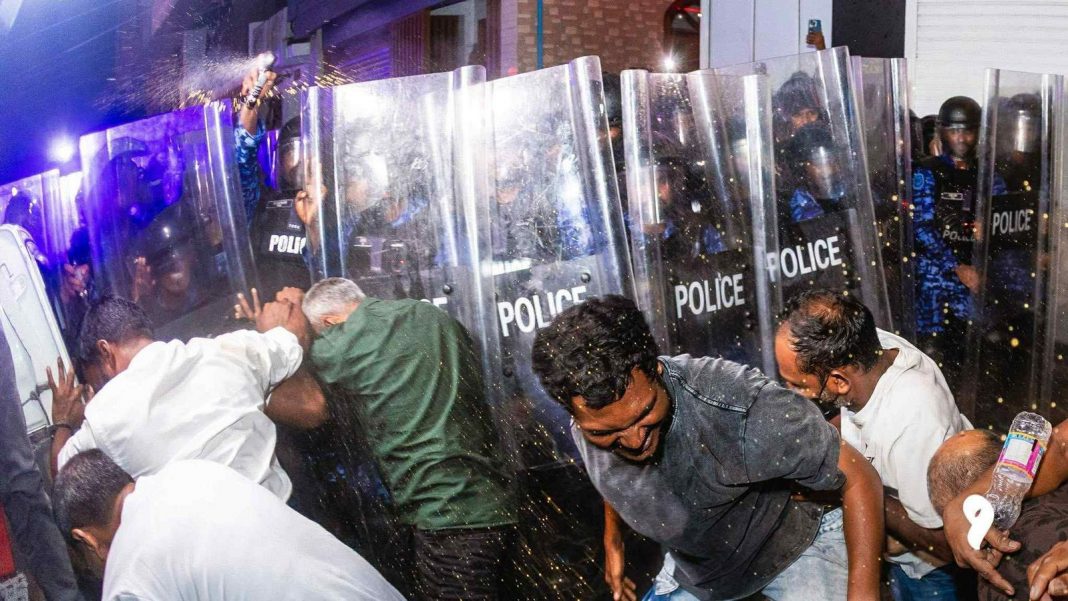New media law sparks protests in Maldives
Signed by President Mohamed Muizzu, the law has shaken the Maldives, raising fears of censorship. Journalists and the country’s opposition call it a direct attack on press freedom, while the government sees it as needed reform and transparency. The legislation comes at a delicate time for the Maldives’s young democracy, already plagued by political tensions.
Malé (AsiaNews/Agencies) – A wave of criticism has engulfed the Maldives government following the recent approval of a new media law, which journalists, the opposition, and international observers say seriously threatens press freedom.
Rushed through parliament, the Media and Broadcasting Regulation Act concentrates vast oversight power in the hands of a new state commission, authorised to suspend licences, block websites, and even close editorial offices deemed in violation of the law.
According to the government, the law seeks to upgrade regulation and boost transparency.
But for the Maldives Journalists Association (MJA), international organisations, and now the United Nations, it is an attempt to muzzle the press and intimidate independent journalists.
The legislation sets up a seven-member Media and Broadcasting Commission, replacing two previous bodies: the Maldives Media Council and the Broadcasting Commission.
The new entity will be able to suspend licenses during investigations, block live broadcasts, and ask the courts to revoke permits for media outlets deemed in breach of their obligations.
Furthermore, the law authorises the police to physically stop “illegal” broadcasts and imposes fines of up to 25,000 rufiyaa (about US,625) for journalists and up to 100,000 rufiyaa (about US$ 6,500) for news media.
This burden, in a country with fewer than 50 active newsrooms, risks severely impacting independent journalism.
One of the most contested provisions is the obligation for the media to respect the constitution, Islam, national security, and social values. Observers denounce these vague terms, which could justify censorship of any critical content.
The measure was passed during an extraordinary session of parliament, while the chamber was formally in recess. According to witnesses, some MPs had only fifteen minutes to read the text before the vote.
Seven opposition MPs were expelled for protesting, while protesters and journalists were pushed back by police outside.
On the same day, members of the MJA rallied in front of Parliament, the presidential office, and the official residence of the president, calling the law a “serious threat” to press freedom.
At least three journalists were briefly detained and later released.
Despite the tensions, the law passed without difficulty thanks to the solid majority of President Muizzu's People's National Party (PNC): 60 votes in favour and only one against.
The international community's reaction has been critical.
The law “will seriously undermine media freedom and the right to freedom of expression for the people of the Maldives if not withdrawn,” reads a statement by the UN Human Rights Office.
According to the UN agency, the new rules introduce restrictions incompatible with the International Covenant on Civil and Political Rights, to which the Maldives is a signatory, and grant the new oversight body "intrusive" powers to conduct investigations, impose fines, and revoke licences.
The law “follows a worrying erosion of institutional checks and balances,” the statement goes on to say. Because of this, “UN High Commissioner for Human Rights Volker Türk appeals to the authorities to repeal the legislation and offers the Office’s assistance to the Maldives in ensuring any media reforms comply with its international human rights obligations.”
Other organisations have also expressed concern. The Committee to Protect Journalists called the law a serious threat to press freedom, while the International Federation of Journalists branded it “draconian”. For its part, Reporters Without Borders notes that the Maldives has fallen to 104th place in its 2025 World Press Freedom Index.
The government defends the law, emphasising that it is meant to lay out clear journalistic standards and ensure greater transparency and credibility in public information.
By contrast, the country’s political opposition views it as a return to darker times. For former President Ibrahim Mohamed Solih, the law marks "the end of press freedom”, while other political leaders see it as a war on truth.
The Maldives, an archipelago home to 530,000 people often associated with high-end tourism, has only experienced a fragile democracy since 2008 after decades of authoritarian rule.
Today, according to many observers, the new media law represents a decisive test to measure the balance between freedom of expression and government control over the country.
15/12/2020 09:40
24/01/2007







.png)










